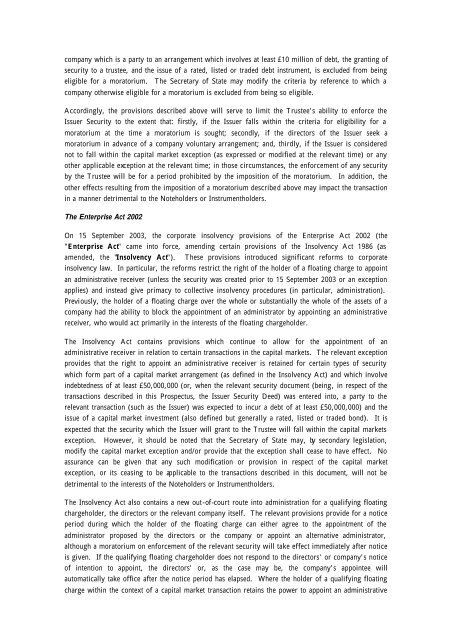ALBA 2007 â 1 plc - Irish Stock Exchange
ALBA 2007 â 1 plc - Irish Stock Exchange
ALBA 2007 â 1 plc - Irish Stock Exchange
Create successful ePaper yourself
Turn your PDF publications into a flip-book with our unique Google optimized e-Paper software.
company which is a party to an arrangement which involves at least £10 million of debt, the granting of<br />
security to a trustee, and the issue of a rated, listed or traded debt instrument, is excluded from being<br />
eligible for a moratorium. The Secretary of State may modify the criteria by reference to which a<br />
company otherwise eligible for a moratorium is excluded from being so eligible.<br />
Accordingly, the provisions described above will serve to limit the Trustee's ability to enforce the<br />
Issuer Security to the extent that: firstly, if the Issuer falls within the criteria for eligibility for a<br />
moratorium at the time a moratorium is sought; secondly, if the directors of the Issuer seek a<br />
moratorium in advance of a company voluntary arrangement; and, thirdly, if the Issuer is considered<br />
not to fall within the capital market exception (as expressed or modified at the relevant time) or any<br />
other applicable exception at the relevant time; in those circumstances, the enforcement of any security<br />
by the Trustee will be for a period prohibited by the imposition of the moratorium. In addition, the<br />
other effects resulting from the imposition of a moratorium described above may impact the transaction<br />
in a manner detrimental to the Noteholders or Instrumentholders.<br />
The Enterprise Act 2002<br />
On 15 September 2003, the corporate insolvency provisions of the Enterprise Act 2002 (the<br />
"Enterprise Act" came into force, amending certain provisions of the Insolvency Act 1986 (as<br />
amended, the "Insolvency Act"). These provisions introduced significant reforms to corporate<br />
insolvency law. In particular, the reforms restrict the right of the holder of a floating charge to appoint<br />
an administrative receiver (unless the security was created prior to 15 September 2003 or an exception<br />
applies) and instead give primacy to collective insolvency procedures (in particular, administration).<br />
Previously, the holder of a floating charge over the whole or substantially the whole of the assets of a<br />
company had the ability to block the appointment of an administrator by appointing an administrative<br />
receiver, who would act primarily in the interests of the floating chargeholder.<br />
The Insolvency Act contains provisions which continue to allow for the appointment of an<br />
administrative receiver in relation to certain transactions in the capital markets. The relevant exception<br />
provides that the right to appoint an administrative receiver is retained for certain types of security<br />
which form part of a capital market arrangement (as defined in the Insolvency Act) and which involve<br />
indebtedness of at least £50,000,000 (or, when the relevant security document (being, in respect of the<br />
transactions described in this Prospectus, the Issuer Security Deed) was entered into, a party to the<br />
relevant transaction (such as the Issuer) was expected to incur a debt of at least £50,000,000) and the<br />
issue of a capital market investment (also defined but generally a rated, listed or traded bond). It is<br />
expected that the security which the Issuer will grant to the Trustee will fall within the capital markets<br />
exception. However, it should be noted that the Secretary of State may, by secondary legislation,<br />
modify the capital market exception and/or provide that the exception shall cease to have effect. No<br />
assurance can be given that any such modification or provision in respect of the capital market<br />
exception, or its ceasing to be applicable to the transactions described in this document, will not be<br />
detrimental to the interests of the Noteholders or Instrumentholders.<br />
The Insolvency Act also contains a new out-of-court route into administration for a qualifying floating<br />
chargeholder, the directors or the relevant company itself. The relevant provisions provide for a notice<br />
period during which the holder of the floating charge can either agree to the appointment of the<br />
administrator proposed by the directors or the company or appoint an alternative administrator,<br />
although a moratorium on enforcement of the relevant security will take effect immediately after notice<br />
is given. If the qualifying floating chargeholder does not respond to the directors' or company's notice<br />
of intention to appoint, the directors' or, as the case may be, the company's appointee will<br />
automatically take office after the notice period has elapsed. Where the holder of a qualifying floating<br />
charge within the context of a capital market transaction retains the power to appoint an administrative

















